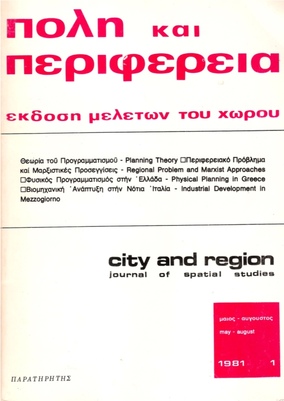[Abstract Title:] Internationalization of Capital and Polarization of Accumulation
Part of : Πόλη και περιφέρεια : έκδοση μελετών του χώρου ; No.13, 1987, pages 144
Issue:
Pages:
144
Parallel Title:
Internationalization of Capital and Polarization of Accumulation
Section Title:
Περιλήψεις συνεδρίου
Author:
Abstract:
Restructuring tendencies of the world capitalist production are usually approached by means of theoretical constructions based on the conception that capitalism constitutes a unified socio-economical world-structure. They claim, therefore, that capitalist development in a country is determined either by the interests of the "world capitalist system" as a whole (f.e. the theory of "the new international division of labour"), or by the "decisions" of transnational enterprises (f.e.the theory of "transnational entreprise integration"). According to my opinion, this type of approaches to internationalization of capitalist production is so schematic that it cannot be useful to scientific analysis. Empirical data shows that we don't have to do with transposition of any branch of capitalist production from the developed to the third-world countries, but only with an improvement of the position in international competition of some third-world countries, a result which is mainly connected with social and economic change in these countries. Furthermore, the theory of modification of the law of value on the world market, a theoretical approach based on the analysis and the caterogies established by the marxist critique of political economy, can show that the conceptions of "world capitalist structure", are theoretically inconsistent and contradictory. The domination of capitalist mode of production can be established in its adequate economic, political and ideological forms only in the interior of a capitalist social formation. Individual capitalists are constituted to ideal-social capital only within the limits of the national state. Capitalist development, that is the extended reproduction of capitalist relations of power and capitalist structures in all social instances, depends on the internal, mainly, relations of power in each social formation, that is, on the results and forms of class-struggle in it. Furthermore, capitalist development is identical with the ability of forming of a productive collective worker for the capitalist mode of production. Underdevelopment is always connected with the inability (as a result of the class relations of power), mainly to form a productive collective worker, and less with the lack of adequate means of production, technology etc. The reasons of underdevelopment of peripheral countries shall therefore, first of all, be sought on the characteristics of class-power and class-struggle in each national social formation. Dependence relations and imperialist exploitation do not exist prior to relations of class power and exploitation; contrariwise, they are formed in accordance to class relations. Imperialist internationalization of capital and imperialist exploitation does not mean that the national state ceases to constitute the specific social instance which consolidates and condenses class power. Imperialism denotes the formation of a specific articulation between the different social formations, that is the constitution of the imperialist chain, with its links (the national states) radically differentiated, unequally developed and developing with different rates. In the second part of this paper, certain aspects of the development and internationalization of greek capitalism were investigated. In contradiction to the ideological caricature of "imperialist dependence", the dependence of social process and capital polarization in contemporary Greece on class power relations and class-struggle was illustrated.
Subject:
Subject (LC):
Notes:
Περιλήψεις των παρουσιάσεων στο συνέδριο της ΛέσβουAbstracts of papers presented at the Lesvos conference




